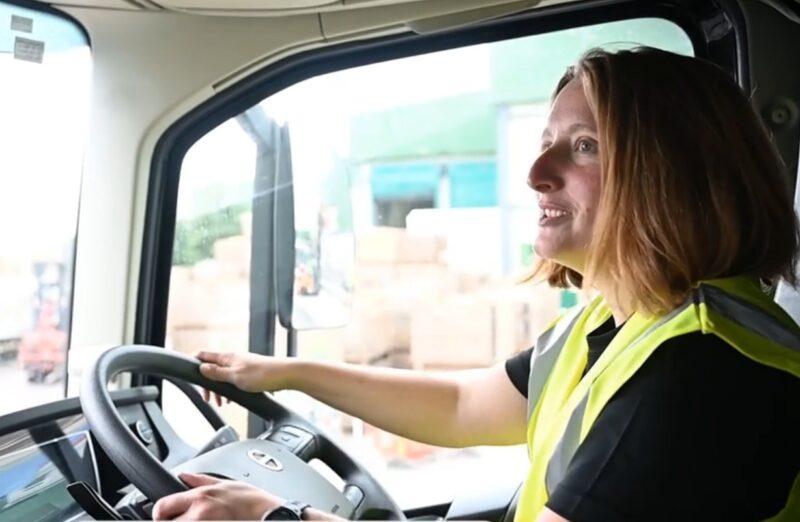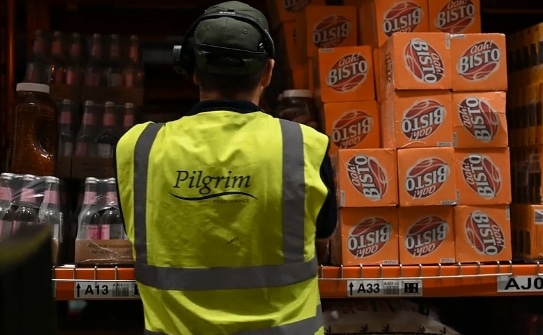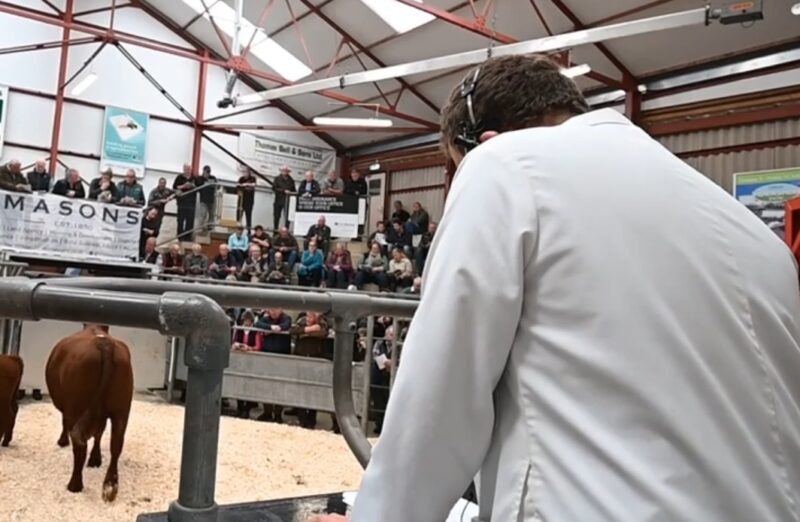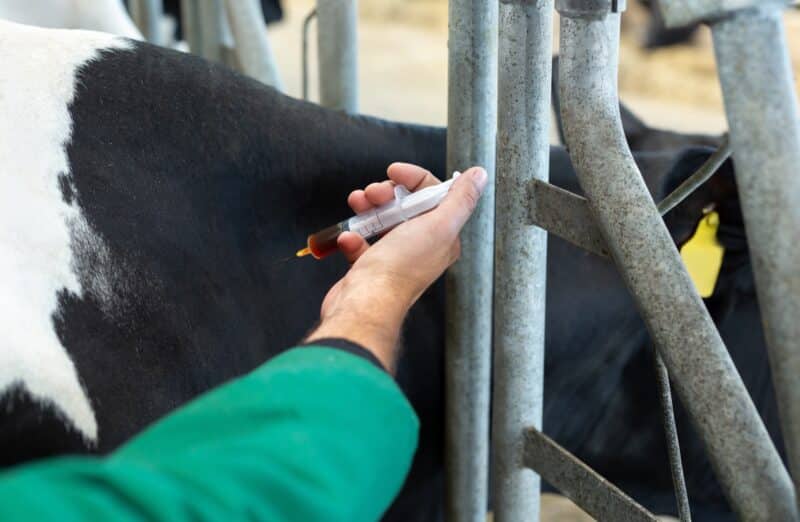Agriculture Support Services
Support services are the backbone of Lincolnshire’s vital agricultural sector, ensuring the smooth operation of farms, food production facilities, and manufacturing plants. These services play an essential role in supporting every stage of the supply chain, from providing agricultural inputs to handling logistics and veterinary care.

Encompassing a diverse range of industries, support services include transportation, storage, consulting, and pest control, all of which are critical to the efficiency and sustainability of the sector. Whether it’s ensuring the health of livestock, delivering seeds and fertilisers, or managing the storage and transport of goods, these roles are integral to keeping Lincolnshire’s agricultural economy thriving.
These businesses offer opportunities for individuals passionate about problem-solving, logistics, and providing solutions that sustain one of the UK’s most essential industries. From farm to fork, support services ensure every link in the agricultural chain is strong and reliable.
Business types within this sector include:

Transportation and logistics
Transportation and logistics companies are the lifeline of Lincolnshire’s agricultural sector, ensuring that crops, livestock, and food products move efficiently from farms to processing plants, manufacturers, and eventually to consumers. These businesses range from small, family-run operators handling local deliveries to large-scale enterprises managing national and international distribution networks.
Specialist transport services ensure perishable goods like fruits, vegetables, and meat are delivered swiftly and safely, maintaining quality and freshness. Logistics providers coordinate complex supply chains, managing the movement of agricultural inputs, finished goods, and raw materials with precision.
While larger companies may have dedicated teams for planning, driving, and warehouse operations, smaller firms often require employees to take on varied responsibilities. Regardless of size, transportation and logistics companies play a critical role in sustaining Lincolnshire’s agricultural economy and ensuring food security across the UK.
Working in transportation and logistics is perfect for someone who enjoys problem-solving, thrives in fast-paced environments, and takes pride in ensuring the smooth flow of goods. Whether you’re coordinating shipments, driving specialised vehicles, or managing warehouse operations, each role in this sector contributes to the efficiency of the agricultural supply chain and the delivery of essential products.
For those who enjoy planning, working with technology, or being part of a dynamic team, transportation and logistics offer a wide variety of rewarding career paths. No two days are the same, and every task plays a vital role in connecting Lincolnshire’s agricultural industry to markets across the UK and beyond.

Storage, packaging and warehousing
Storage, packaging, and warehousing companies are essential to Lincolnshire’s agricultural sector, ensuring that fresh produce, raw materials, and finished goods are stored safely, packaged efficiently, and distributed seamlessly. These businesses range from large-scale operations managing high-volume logistics to smaller, specialised facilities offering tailored solutions for local producers.
Professionals in this sector handle tasks such as inventory management, packaging design, quality control, and maintaining optimal storage conditions. Roles require attention to detail, strong organisational skills, and the ability to adapt to the fast-paced demands of the supply chain.
This collaborative approach ensures that every product is handled with care and precision, reflecting the dedication of those who keep the agricultural supply chain moving. Storage, packaging, and warehousing offer rewarding career paths for individuals who enjoy problem-solving, working as part of a team, and playing a vital role in delivering quality goods to market.
Working in storage, packaging, and warehousing suits those who enjoy organisation, problem-solving, and playing a crucial role in the agricultural supply chain. It requires attention to detail, self-motivation, and the ability to manage tasks such as inventory control, quality checks, and efficient packaging and storage processes.
It’s perfect for individuals who thrive in structured environments, enjoy teamwork, and take pride in ensuring products are handled with care and precision. Many storage and packaging businesses in Lincolnshire are family-run or small-scale operations, offering a unique opportunity to contribute to the success of the region’s agricultural industry by delivering fresh, high-quality goods to market efficiently and sustainably.

Agricultural inputs including seed and fertiliser suppliers and pest control
Seed and fertiliser suppliers and pest control providers are critical to the success of Lincolnshire’s agricultural sector, supporting farmers in growing healthy, productive crops and maintaining sustainable farming practices. These businesses range from small, specialised operations offering tailored advice to large-scale suppliers serving farms across the UK.
Larger providers often have teams dedicated to distribution, product development, and technical support, while smaller operations may combine advisory services with sales and delivery. Roles in these businesses suit individuals who enjoy problem-solving, working with farmers, and applying technical knowledge to achieve results.
From delivering high-quality seeds and fertilisers to managing pest control strategies, these businesses offer rewarding opportunities to support the agricultural industry while ensuring sustainable and efficient crop production.
Working with seed and fertiliser providers or as a pest control specialist is perfect for individuals passionate about supporting agriculture and helping farmers maximise crop health and productivity.
Whether you’re advising on the best products, delivering essential supplies, or implementing pest management strategies, these roles suit those who thrive on problem-solving, teamwork, and applying technical knowledge to achieve tangible results in the farming industry.

Livestock auctions and abattoirs
Livestock auctions and abattoirs in Lincolnshire play a crucial role in the agricultural supply chain, connecting farmers to buyers and ensuring high-quality meat products reach consumers. These facilities range from small, local auction houses and processing plants to large-scale operations serving regional and national markets.
Larger facilities have specialised teams managing livestock handling, processing, quality control, and logistics, ensuring compliance with animal welfare and food safety regulations. Smaller operations often require team members to take on diverse responsibilities, fostering adaptability and collaboration.
From managing livestock sales to processing meat for distribution, livestock auctions and abattoirs offer rewarding career opportunities for individuals who enjoy hands-on work, thrive in fast-paced environments, and take pride in ensuring the smooth and ethical operation of the livestock industry.
Working in livestock auctions and abattoirs is ideal for individuals who are passionate about agriculture, enjoy hands-on roles, and thrive in structured, fast-paced environments. Whether you’re involved in managing livestock sales, ensuring animal welfare, or overseeing meat processing operations, these roles are both dynamic and rewarding.
These positions suit individuals who are detail-oriented, committed to high standards, and dedicated to contributing to the smooth operation of the livestock supply chain. It’s a great fit for those who excel at problem-solving, teamwork, and ensuring quality and efficiency in an essential industry.

Veterinarians
Veterinarians in the agricultural sector are essential to maintaining the health and welfare of livestock, supporting farmers, and ensuring the sustainability of the agricultural supply chain. Their work spans from small, family-run farms to large-scale operations, providing expertise in animal health, disease prevention, and treatment.
In larger operations, veterinarians often specialise in areas such as herd health management or biosecurity, while in smaller settings, they may handle a broader range of responsibilities, fostering adaptability and close collaboration with farmers.
From conducting routine health checks and providing emergency care to advising on best practices for animal welfare, veterinarians offer rewarding career opportunities for individuals who thrive in hands-on roles, enjoy problem-solving, and take pride in contributing to the wellbeing of livestock and the success of the agricultural industry.
Working as a veterinarian in the agricultural sector is ideal for individuals who are passionate about animal welfare, enjoy hands-on roles, and thrive in environments where they can make a tangible impact. Whether you’re involved in preventative care, diagnosing and treating illnesses, or advising on best practices for livestock health, these roles are both dynamic and rewarding.
These positions suit individuals who are detail-oriented, committed to high welfare standards, and dedicated to supporting the success of farmers and the broader agricultural industry. It’s a great fit for those who excel at problem-solving, teamwork, and ensuring the health and productivity of livestock in an essential sector.

Consulting services
Agricultural consultants are essential to supporting farmers, improving productivity, and ensuring the sustainability of the agricultural sector. Their work spans from small, family-run farms to large-scale operations, providing expertise in areas such as crop management, livestock care, business planning, and environmental stewardship.
In larger operations, consultants often specialise in areas like precision farming, soil health, or financial strategy, while in smaller settings, they may handle a broader range of responsibilities, fostering adaptability and close collaboration with farmers.
From advising on best practices and implementing innovative solutions to solving complex challenges, agricultural consultants offer rewarding career opportunities for individuals who thrive on problem-solving, enjoy working closely with farmers, and take pride in contributing to the success and resilience of the agricultural industry.
Working as an agricultural consultant is ideal for individuals who are passionate about supporting farmers, solving challenges, and driving sustainable agricultural practices. Whether you’re advising on crop management, improving livestock productivity, or helping with business planning, these roles are both dynamic and rewarding.
These positions suit individuals who are detail-oriented, committed to delivering results, and dedicated to supporting the success and resilience of the agricultural industry. It’s a great fit for those who excel at problem-solving, teamwork, and applying technical expertise to create tangible improvements on farms and in agricultural businesses.
Check out the different roles below:

Management and general operations
Management and leadership teams are crucial to agriculture support services, focusing on operational excellence and team coordination across diverse areas. In transport, they manage goods movement, routing, and fleets. Storage and packaging leaders oversee inventory and quality. Consulting managers drive client strategies and project delivery. Veterinary leaders manage teams and ensure welfare compliance. In agri-inputs, they lead sales and distribution, while auction and abattoir managers handle animal movement, sales, and processing with strict welfare standards.
Key roles: General manager, operations manager, logistics manager, warehouse manager, veterinary practice manager, auction house manager, site manager, business owner/proprietor.
Skills & attributes: Leadership, strategic thinking, operational efficiency, financial acumen, and excellent communication.
These roles suit individuals who excel at leading teams, solving challenges, and ensuring smooth operations in critical agricultural sectors.
Scorecard
Salary Potential*
Flexible Hours
Flexible Location
Physicality
*based on a 40-hour working week

Consulting and advisory roles
In consulting and advisory roles within the agricultural sector, expertise and strategic guidance are at the core of supporting farm operations and driving improvement. These roles focus on advising farmers and agricultural businesses on crop management, livestock productivity, sustainability, and financial planning. Whether it’s developing tailored solutions, analysing data, or implementing new technologies, consultants are essential to enhancing productivity and ensuring long-term success.
Key roles: Agricultural consultant, crop specialist, livestock advisor, environmental advisor, business development consultant.
Skills & attributes: Strong knowledge of agricultural practices, analytical thinking, problem-solving, excellent communication, and adaptability to diverse client needs.
These roles are ideal for individuals who enjoy problem-solving, building relationships, and applying their expertise to make a tangible impact on the agricultural sector’s efficiency and sustainability.
Scorecard
Salary Potential*
Flexible Hours
Flexible Location
Physicality
*based on a 40-hour working week

Veterinary and animal welfare
In veterinary and animal welfare roles, care and expertise are at the heart of ensuring livestock health and productivity. These roles involve diagnosing and treating illnesses, conducting routine health checks, and advising on best practices for animal welfare and disease prevention. Whether it’s managing herd health, how to handle livestock, overseeing biosecurity, or supporting farmers with emergency care, veterinary and animal welfare professionals are essential to the success of agricultural operations.
Key roles: Veterinarian, veterinary technician, animal health officer, abattoir operative, welfare inspector, herd health specialist.
Skills & attributes: Expertise in animal health and welfare, problem-solving, attention to detail, strong communication, and the ability to adapt to diverse environments and situations.
These roles are ideal for individuals who thrive in hands-on settings, are passionate about animal care, and take pride in contributing to the sustainability and success of the agricultural industry.
Scorecard
Salary Potential*
Flexible Hours
Flexible Location
Physicality
*based on a 40-hour working week

Logistics roles
The logistics teams are vital to managing the planning, coordination, and flow of agricultural goods across the supply chain. These roles involve overseeing inventory, managing storage systems, and coordinating transport schedules to ensure timely and efficient delivery. Logistics professionals collaborate with other departments to optimise processes and maintain quality standards. In smaller operations, roles may combine multiple responsibilities, while larger organisations often feature specialised positions.
Key roles: Logistics coordinator, transport planner, warehouse manager, inventory specialist, cold storage manager, fleet operations supervisor, supply planner
Skills & attributes: Strong organisational and analytical skills; attention to detail; proficiency with logistics and inventory management systems; effective communication and problem-solving; ability to adapt to fast-paced and evolving environments.
These roles suit individuals who excel at planning and organisation, thrive on solving challenges, and enjoy playing a crucial role in ensuring agricultural goods reach their destinations efficiently.
Scorecard
Salary Potential*
Flexible Hours
Flexible Location
Physicality
*based on a 40-hour working week

Transportation roles
Transportation roles are essential for ensuring the efficient and timely movement of agricultural goods, livestock, and inputs across the supply chain. These roles involve driving, fleet management, and route planning to connect farms, processing facilities, and markets. From delivering fresh produce to transporting livestock under welfare-compliant conditions, transportation professionals are the backbone of logistics in the agricultural sector.
Whether operating specialised vehicles, coordinating deliveries, or maintaining fleets, these roles require attention to detail, adherence to safety standards, and a commitment to meeting deadlines. Larger organisations often have dedicated teams for planning and maintenance, while smaller businesses may combine roles for greater versatility.
Key roles: HGV driver, livestock transport driver, fleet manager, transport planner, delivery driver, vehicle maintenance technician.
Skills & attributes: Safe driving and vehicle operation, knowledge of transport regulations (including livestock welfare), time management, route optimisation, mechanical aptitude, and excellent communication.
These roles suit individuals who enjoy hands-on work, excel at meeting deadlines, and take pride in contributing to the smooth operation of the agricultural supply chain.
Scorecard
Salary Potential*
Flexible Hours
Flexible Location
Physicality
*based on a 40-hour working week

Storage, packaging and warehousing roles
Storage, packaging, and warehousing roles are essential for preserving the quality of agricultural goods, preparing products for retail or distribution, and ensuring efficient handling across the supply chain. These roles often involve working on production lines, managing inventory, maintaining optimal storage conditions, and operating machinery for packaging or sorting goods.
Professionals in this sector are responsible for keeping processes running smoothly, ensuring quality standards are met, and supporting the timely flow of products to the next stage of the supply chain. In smaller operations, roles may combine multiple tasks, while larger facilities often employ specialised teams for efficiency.
Key roles: warehouse operative, packaging technician, production line worker, cold storage operative, inventory specialist, warehouse manager, forklift operator.
Skills & attributes: Attention to detail, organisational skills, ability to operate machinery, understanding of safety and quality standards, adaptability to fast-paced environments, and teamwork.
These roles suit individuals who thrive in structured, hands-on environments, enjoy working on production lines, and take pride in ensuring agricultural goods are processed and prepared efficiently and safely.
Scorecard
Salary Potential*
Flexible Hours
Flexible Location
Physicality
*based on a 40-hour working week

Quality control roles
Quality control roles are critical across all aspects of agricultural support services, ensuring that processes, products, and services meet industry standards and customer expectations. From monitoring food safety in abattoirs to ensuring the integrity of seeds and fertilisers, these roles involve inspecting, testing, and verifying that goods and operations comply with regulatory and quality benchmarks.
In warehousing and transportation, quality control ensures the safe handling, storage, and delivery of agricultural products. In packaging, it focuses on maintaining hygiene, consistency, and accurate labelling. In abattoirs, roles involve monitoring meat quality and compliance with welfare standards. Across all areas, quality control professionals work to identify issues, suggest improvements, and maintain efficiency.
Key roles: Quality assurance specialist, quality control technician, food safety inspector, compliance officer, packaging inspector, seed quality analyst.
Skills & attributes: Attention to detail, knowledge of quality and safety standards, analytical thinking, problem-solving, technical expertise, and effective communication skills.
These roles suit individuals who are methodical, enjoy working in structured environments, and take pride in ensuring the highest standards are upheld across the agricultural sector.
Scorecard
Salary Potential*
Flexible Hours
Flexible Location
Physicality
*based on a 40-hour working week

Agricultural input roles
Agricultural input roles are essential to supporting farmers by providing the seeds, fertilisers, and pest control solutions needed to optimise crop production and maintain sustainability. These roles involve sourcing, advising on, and delivering high-quality products, ensuring they meet industry standards and the specific needs of customers.
In seed supply, the focus is on developing and distributing reliable, high-yield varieties. Fertiliser providers work to ensure the availability of nutrients tailored to different crops, while pest control specialists focus on protecting crops from diseases and pests using innovative and safe methods. Across all areas, professionals collaborate closely with farmers to identify needs, provide tailored solutions, and maintain efficiency in delivery and application.
Key roles: Sales representative, agronomist, technical advisor, distribution manager, product development specialist, seed quality analyst, pest control technician.
Skills & attributes: Strong knowledge of agricultural products, problem-solving, technical expertise, communication skills, customer focus, and the ability to adapt solutions to diverse farming operations.
These roles suit individuals who are passionate about agriculture, enjoy building relationships, and take pride in providing the tools and expertise that help farmers thrive.
Scorecard
Salary Potential*
Flexible Hours
Flexible Location
Physciality
*based on a 40-hour working week
In addition to hands-on roles, agriculture support services rely on essential support functions such as marketing, finance, procurement, IT, HR, and operations. For more information on these departments and the roles they offer, click here to explore further.
For information on local courses and education providers that could support your career working for agriculture support services businesses, click here.

